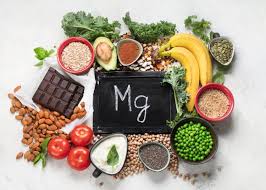
Magnesium is a crucial mineral that plays a vital role in numerous biochemical processes within the body. Essential for maintaining various functions, including muscle and nerve function, blood sugar control, and blood pressure regulation, magnesium is often overlooked in discussions about nutrition. This article explores the benefits of magnesium, its dietary sources, and the importance of ensuring adequate intake for overall health and vitality.
Why Magnesium is Important
1. Supports Muscle Function
Magnesium is essential for muscle contraction and relaxation. It helps regulate calcium levels in the muscles, which is vital for muscle function. A deficiency in magnesium can lead to muscle cramps and spasms, making adequate intake critical for athletes and active individuals.
2. Boosts Energy Production
Magnesium is involved in the conversion of food into energy. It plays a key role in the activation of ATP (adenosine triphosphate), the energy currency of cells. This makes magnesium essential for maintaining energy levels throughout the day.
3. Regulates Blood Sugar Levels
Research suggests that magnesium helps regulate insulin action and plays a role in glucose metabolism. Adequate magnesium intake may reduce the risk of developing type 2 diabetes and assist in managing blood sugar levels for those already diagnosed.
4. Promotes Heart Health
Magnesium contributes to maintaining normal heart rhythms and regulating blood pressure. It helps relax blood vessels, potentially reducing the risk of hypertension and cardiovascular diseases.
5. Supports Mental Health
Magnesium is often referred to as the “calming mineral.” It helps regulate neurotransmitters, which send messages throughout the brain and nervous system. Some studies suggest that magnesium may help alleviate symptoms of anxiety and depression, promoting overall mental well-being.
Dietary Sources of Magnesium
To ensure adequate magnesium intake, consider incorporating the following foods into your diet:
– Leafy Greens: Spinach, kale, and Swiss chard are excellent sources of magnesium.
– Nuts and Seeds: Almonds, cashews, and pumpkin seeds are packed with this important mineral.
– Whole Grains: Brown rice, quinoa, and whole wheat bread contain significant amounts of magnesium.
– Legumes: Beans, lentils, and chickpeas not only provide magnesium but also offer fiber and protein.
– Fatty Fish: Salmon and mackerel are rich in magnesium, along with beneficial omega-3 fatty acids.
Recommended Daily Intake
The recommended dietary allowance (RDA) for magnesium varies by age, sex, and life stage. Adult men generally need about 400-420 mg per day, while adult women require 310-320 mg. Pregnant and breastfeeding women may need higher amounts. It’s essential to consult with a healthcare provider to determine your specific needs.
Conclusion
Magnesium is a vital element for the body, contributing to numerous health benefits, including muscle function, energy production, and mental health support. Incorporating magnesium-rich foods into your diet can help you achieve optimal health and vitality. If you’re concerned about your magnesium levels, consider speaking with a healthcare professional to assess your intake and explore supplementation if necessary.
By understanding the importance of magnesium and making informed dietary choices, you can enhance your body’s vitality and maintain overall well-being. Embrace this essential mineral as part of your healthy lifestyle!




